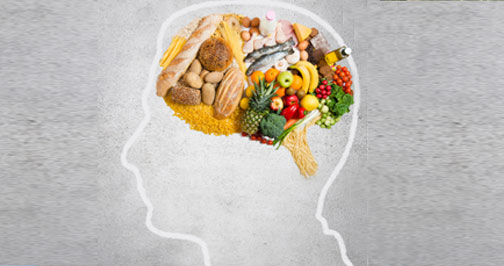THE ROLE OF NUTRITION IN MENTAL HEALTH
First, we need to think about health in an integrative way, that is, we cannot separate body,
mind and emotions. It means that we must nourish beyond the physical body, the brain, as
an organ that expresses the mind, and emotions, to ensure health and well-being, in the
form of positive vitality.
Data has shown that better-quality nutrition is related to better mental health outcomes.1,2,3,4
Not only some nutrients are necessary for proper brain function, but the opposite also holds
true, others can be detrimental, promoting anxiety, lack of memory, mood swings and even"
depression. The full mechanism of the relationship between nutrition and mental health has
not yet been fully clarified, but we can no longer deny this direct relationship.
Physiologically, nutrition is interrelated with mental disorders through hormonal,
neurotransmitter and signalling pathways in the gut that control brain functions such as
appetite, sleep, reward mechanisms, mood and cognitive function. Vitamins and minerals
are required by all biochemical pathways as co-factors for proper enzyme function, and
insufficient nutrient amounts can negatively influence a wide variety of metabolic processes.
Many different nutrients have been studied and reported to be involved in pathways relevant
to mental disorders and brain function.
A diet based on natural and whole foods such as grains, fruits, vegetables, legumes, nuts,
seeds, fish and extra virgin olive oil can contribute to the prevention of a number of brain
diseases, to slower rates of cognitive decline and serve as a basis for minimizing anxiety,
providing nutrients vital for the production of neurotransmitters and hormones by the body.
On the other hand, scientific studies have shown a relationship between the consumption of
sugar and processed foods, low in nutrients, with an increase in anxiety and depression.5,6
Nutritional monitoring is vital as nutrition is personal, that is, each individual has specific
needs for certain nutrients and the amounts also vary. It is essential to respect our
biochemical individuality, taking into account that there is no single anti-anxiety / depression
food solution. Seeing as nutrients and their quantities will not be the same for everyone, it is
necessary to know the history of the patient and their family, their symptoms, their habits and
lifestyle and, in some cases, order laboratory tests, and only then recommend an
appropriate plan.
References:
1. Meegan, A. P., Perry, I. J., & Phillips, C. M. (2017). The association between dietary
quality and dietary guideline adherence with mental health outcomes in adults: A cross-
sectional analysis. Nutrients, 9(3), 1-13.
2. Lai, J., Hiles, S., Bisquera, A., Hure, A. J., McEvoy, M., & Attia, J. (2014). A systematic
review and meta-analysis of dietary patterns and depression in community-dwelling
adults. The American Journal of Clinical Nutrition, 99, 181–197.
3. Psaltopoulou, T., Sergentanis, T. N., Panagiotakos, D. B., Sergentanis, I. N., Kosti, R., &
Scarmeas, N. (2013). Mediterranean diet, stroke, cognitive impairment, and depression:
A meta-analysis. Annals of Neurology, 74(4), 580–591.
4. Sánchez-Villegas, A., Delgado-Rodríguez, M., Alonso, A., Schlatter, J., Lahortiga, F.,
Majem, L.S., & Martínez-González, M.A. (2009). Association of the Mediterranean
dietary pattern with the incidence of depression: The Seguimiento Universidad de
Navarra/University of Navarra follow-up (sun) cohort. Arch Gen Psychiatry, 66(10): 1090-
1098.
5. Sánchez-Villegas, A., Toledo, E., De Irala, J., Ruiz-Canela, M., Pla-Vidal, J., & Martínez-
González, M. A. (2012). Fast-food and commercial baked goods consumption and the
risk of depression. Public Health Nutrition, 15(3), 424–432.
6. Westover, A. N., & Marangell, L. B. (2002). A cross-national relationship between sugar
consumption and major depression? Depression and Anxiety, 16(3), 118–120.
Back


